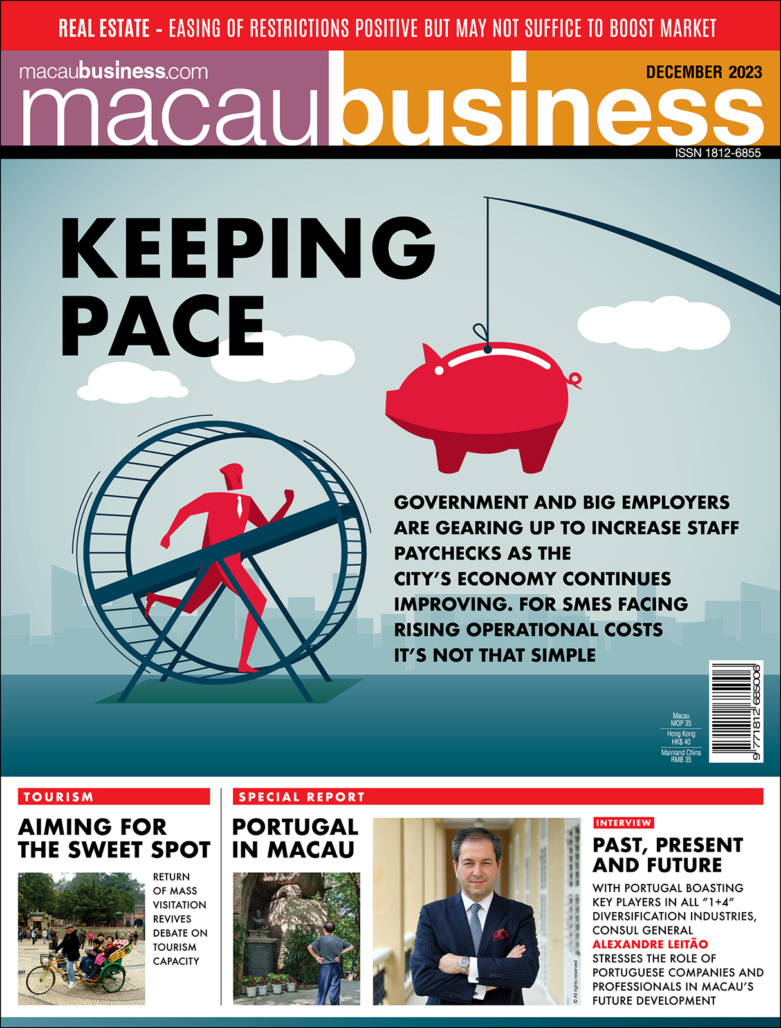Macau Business Editorial |December 2023 | By José Carlos Matias – Director
What a difference a year makes. Last year, just as we were finally glimpsing the light at the end of the ‘zero-COVID’ tunnel, there was a sudden – somewhat unexpected but absolutely necessary and overdue – departure from pandemic restrictions. We all tend to somehow bury that three-year period in our memory – suspended as a sort of alternative timeline – and then bridge from late 2019 straight to early 2023.

But we all know it’s not that simple. Unsurprisingly, we were never going to emerge from those years unscathed, coinciding as they did with heightened geopolitical tensions globally and transformations in the SARs internally.
Nevertheless, as those who refused to hear the mantra of ‘the end is nigh’ stressed, ‘We will always have Macau,’ and whoever is long on Macau reaps benefits. Despite lingering problems, what we have witnessed in 2023 conspicuously validates that sentiment.
Still, no matter how unique this place is, we do not live in a bubble. The SAR is undoubtedly impacted by domestic, national and global developments.
The fourth quarter of the year has brought an important reminder that global interdependence mandates a return to a managed (cooperation and rivalry) model that ‘sets the floor’ for relations between the two top powerhouses of our era – China and the United States – as indicated when the leaders of both countries met in mid-November. A few days earlier, the visit by Australia’s Prime Minister to China embodied a much-welcomed change of tone and substance in relations between Canberra and Beijing.
While thorny issues remain, the prospect of a ‘stabilizer’ is prerequisite to finding a way forward. Still, we all know that risks loom large, and in that respect, the world in 2024 is poised for pivotal political events, among them January’s elections in Taiwan, the European Parliament elections in June and the US presidential vote in November. All of this will take place against the backdrop of ongoing armed conflicts in Ukraine and the Middle East, with the engines of growth in the international economy struggling to gain steam. According to the International Monetary Fund (IMF), the average growth rate of advanced economies is forecast to slow to 1.4 per cent in 2024.
Macau, with its idiosyncratic economic structure, is set to continue its stellar expansion of gross domestic product (GDP): from 74.4 per cent estimated for this year to 27.2 per cent in 2024. It’s worth noting, however, that if the IMF’s prediction is met, the city will still only have recovered to 88 per cent of pre-pandemic (2019) levels by next year.
As we are aware, the lion’s share of the SAR’s GDP is related to exports of services: gaming and tourism. In this respect, the recovery trend seems sound, though one should keep an eye on the pace of economic growth in the region’s major source market of visitors, mainland China, and how disposable income will expand alongside the approach to capital (out)flows. The impact of the recent stimulus measures adopted by the Central Government and the prospect of additional, perhaps bolder, moves in early 2024 will determine not only China’s growth rate but also how it will contribute to offsetting the sluggish performance of advanced economies. Macau would obviously benefit from the spillover effect of a larger-scale stimulus package, as seen in the aftermath of the 2008 financial crisis. In any case, the spectre of a mammoth hot money bundle like the one we saw back then understandably haunts policymakers.

With the local economy in sound recovery mode, the case for a more expansionary budget may seem counterintuitive, but we would call it necessary. In that respect, while it was wise and key to continue key social welfare policies and resume others, including a salary hike for civil servants, maintaining the pandemic-era cuts to public service expenditure is questionable and out of sync. One mustn’t forget that procurement of goods and services by the Administration can be critical for local SMEs, which deserve to be stimulated alongside an integrated – not piecemeal – set of measures. It would be wrong and a mistake to sweep these woes under the rug.
Being the last year of Ho Iat Seng’s first term and a year filled with momentous milestones, namely the Chief Executive election, the appointment of high-ranking officials for a new term, the 25th anniversary of the establishment of the Macau SAR, and the sixth Forum Macau ministerial conference, effective management of time and allocation of resources in 2024 will be key to making up for the lost time during the pandemic and meeting important development targets in the SAR and in Hengqin’s In-depth Cooperation Zone, which is set to take a more centre stage position in the concrete steps and results. Hopefully, all in time for the anticipated visit of President Xi Jinping, expected to be held around December 19/20.
A year can make a difference, but time flies in the blink of an eye.
























